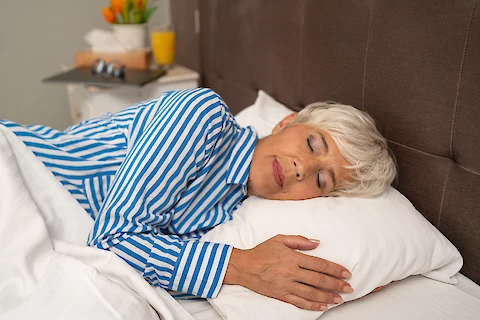
Sleep is vital to overall health, especially for seniors, as they require quality rest to maintain energy, improve memory recall, and ensure daily wellness. As the colder months roll in, daylight and temperature changes can disrupt their sleep patterns. Proper light exposure, regular physical activity, and a balanced diet all contribute to better sleep.
The Challenges of Winter Sleep for Seniors
In winter, shorter daylight hours can disrupt seniors' circadian rhythms, also known as our 'internal body clock.' This can potentially lead to sleep-related problems, such as insomnia or poor sleep quality. Colder temperatures can also cause discomfort during sleep if not managed properly.
Creating a Cozy Sleep Environment
A critical component of good sleep is a cozy, comfy sleeping environment. This involves choosing bedding and sleepwear to help seniors stay warm without overheating. Opt for breathable fabrics like cotton or bamboo; these can help regulate body temperature effectively. Also, consider investing in a thermostat to maintain an optimal room temperature. The National Sleep Foundation recommends keeping the bedroom between 60 and 67 degrees Fahrenheit, which fosters the best conditions for restful sleep. However, some seniors may prefer a warmer sleeping environment to stay comfortable.
Maintaining a Consistent Sleep Schedule
Establishing and sticking to a regular sleep schedule can significantly improve sleep quality. Try to go to bed and wake up at the same times each day; consistency reinforces the body's sleep-wake cycle and promotes better sleep.
Light Exposure and Sleep
Natural sunlight plays a crucial role in regulating our sleep-wake cycle. During winter, the reduced daylight hours could potentially disturb this cycle. To counteract this, make an effort to get outside in natural daylight whenever possible, perhaps by taking a short walk in the morning. In addition, consider using light therapy lamps, which mimic natural outdoor light and can be beneficial in promoting sleep.
Physical Activity and Sleep
Regular physical activity not only boosts overall health but also aids in achieving better sleep. Incorporating daily exercises, even simple ones like walking or stretching, can help maintain regular sleep patterns. However, avoid vigorous exercises close to bedtime as it can interfere with your sleep.
Diet and Sleep
What and when we eat can markedly influence our sleep. Avoid consuming heavy meals too close to bedtime and limit the intake of caffeine and alcohol, as these may disrupt sleep. Consuming foods rich in magnesium, such as bananas, almonds, or whole grains, can enhance sleep quality. Warm liquids like herbal tea or warm milk before bed can also soothe the body and prepare it for sleep.
Get More Help Maintaining Senior Quality of Life
A good night's sleep is paramount for seniors, and understanding the unique challenges of winter can help effectively manage and maintain restful sleep. Prioritizing a cozy sleep environment, a steady sleep schedule, adequate light exposure, regular physical activity, and a balanced diet can all contribute to a healthier sleep routine during those colder months. If you or a loved one need help or more information about senior health and wellness in Elmira, Ithaca, Corning, Bath, or Watkins Glen, please reach out to us at Senior Helpers Elmira-Ithaca. Our in-home care services can help promote a better overall quality of life, including increasing daily activity levels or providing support with healthy eating.